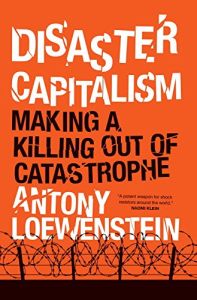Join getAbstract to access the summary!

Join getAbstract to access the summary!
Antony Loewenstein
Disaster Capitalism
Making a Killing Out of Catastrophe
Verso Books, 2015
What's inside?
An astute outsider’s view of the economics of crime and calamity.
Recommendation
Guardian columnist and documentary filmmaker Antony Loewenstein reports on people who make a profit from disaster in the form of private security guards in Afghanistan, for-profit prison administrators in the United States and suppliers of relief efforts in Haiti. Loewenstein describes these and more examples of opportunists making money from catastrophes as manifestations of a “Mad Max economy” that enriches the fortunate few. World – and especially US – leaders have bought into the bogus argument that the private sector knows best, and that for-profit companies are better than governments at cleaning up after natural disasters, waging war, holding prisoners and creating jobs. The truth, Loewenstein argues, is that disaster capitalists aren’t successful at any of those tasks. They mistreat those in their care and overcharge their government clients. A self-described “activist,” Loewenstein doesn’t claim objectivity. Yet, he raises valid points and illuminates issues of concern to readers of all political stripes. While always politically neutral, getAbstract recommends Loewenstein’s report to investors and policy makers seeking an outsider’s view of the economics of crime and calamity.
Summary
About the Author
Independent journalist and documentary filmmaker Antony Loewenstein writes a column for The Guardian and has written three books, including Profits of Doom.

















Comment on this summary